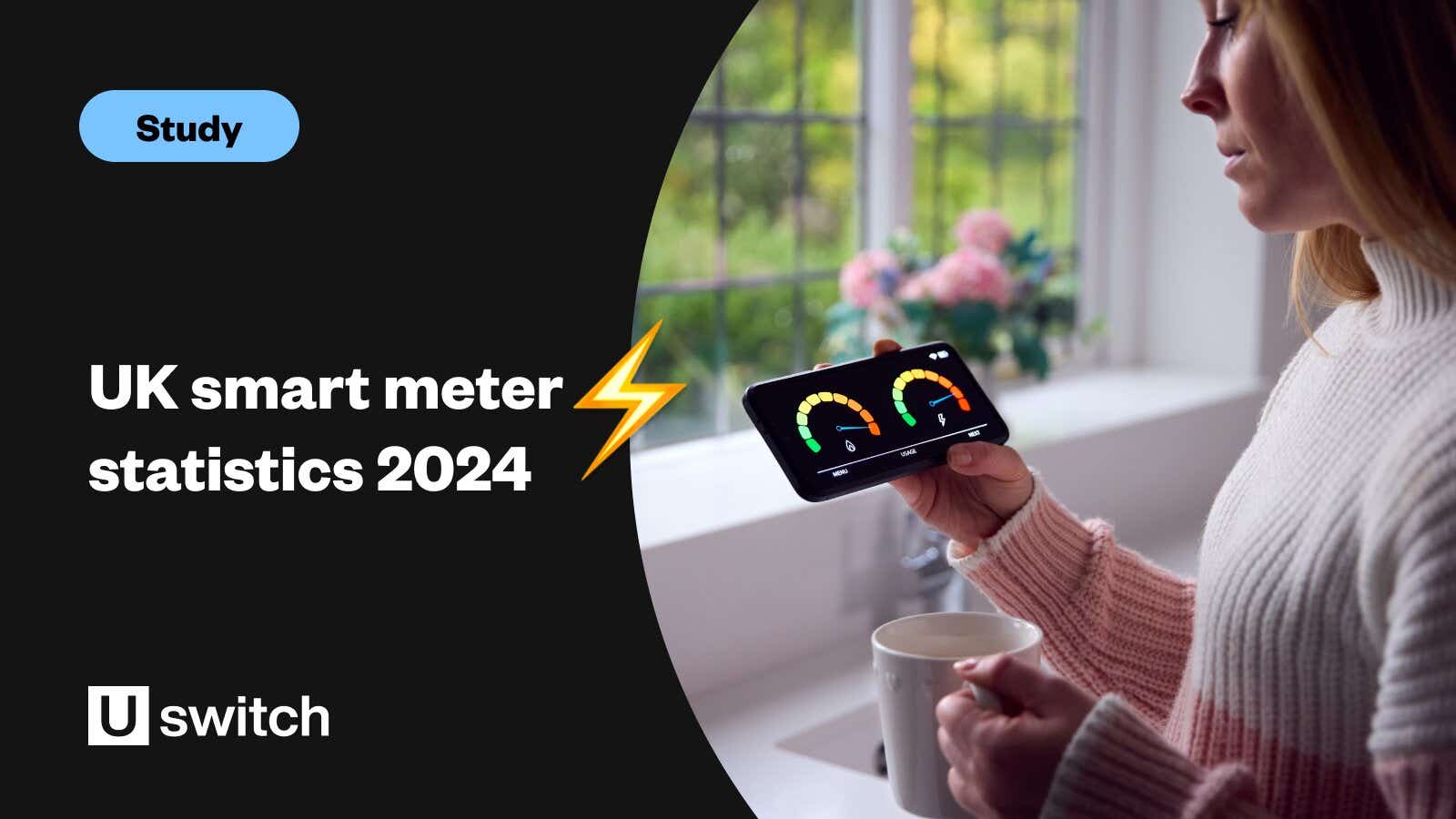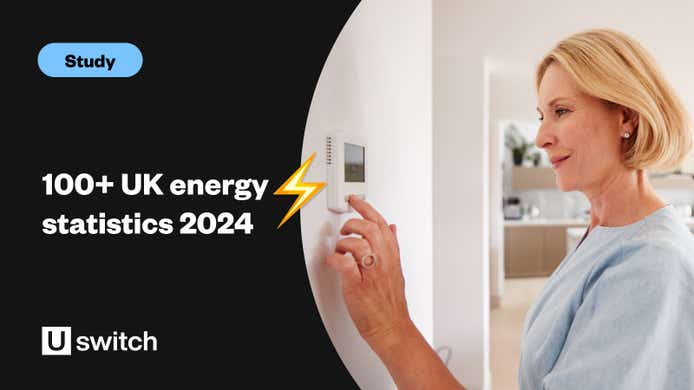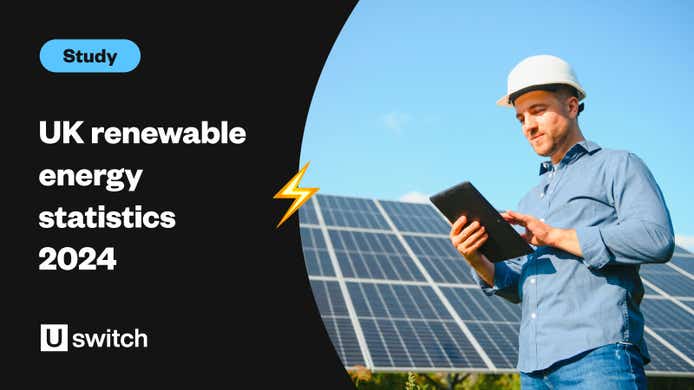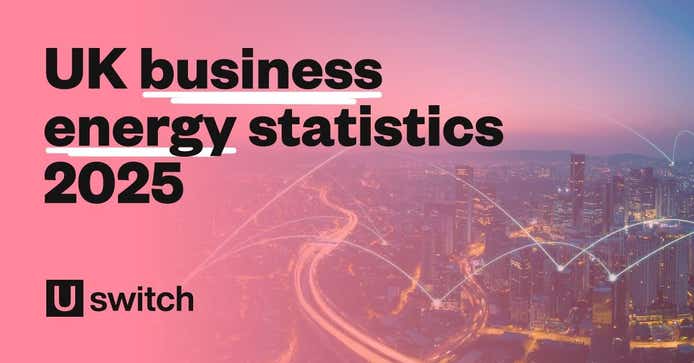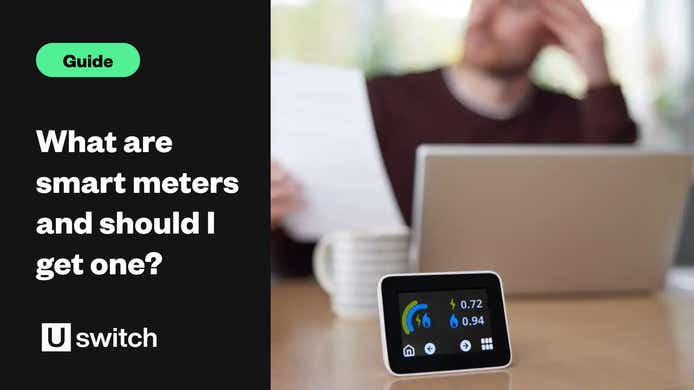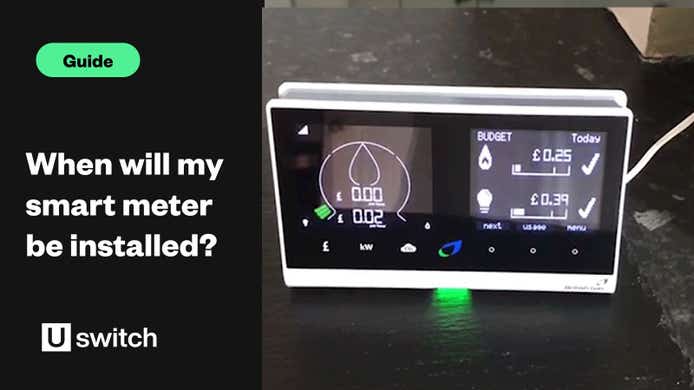Smart meters were first invented in 1974 as a means of managing and tracking energy consumption. Fifty years later, government and industry experts view them as a key tool to keep consumer costs down and tackle climate change.
As the rollout of smart meters ramps up, what better time to collate the definitive UK smart meter statistics report? This page will cover the number of smart meters installed in the UK, the government rollout scheme, and survey results sharing how the UK public feels about smart meters.
Top UK smart meter statistics for 2024
Almost all domestic smart meters (99%) are installed by large energy suppliers.
More than a quarter (28%) of non-domestic smart meters in the UK are installed by small energy suppliers.
Between Q1 2019 and Q3 2023, the number of smart meters in the UK more than doubled (+114%).
In the same time frame, the number of non-smart meters dropped by a third (33%).
The take-up of smart meters increased across the UK from 1% in 2012 to 60% in 2023.
Uswitch survey data reveals that two-thirds (66%) of people with a smart meter were satisfied with its installation.
Data shows that 95.5% of smart meters provided correct readings for energy suppliers.
How many smart meters are installed in the UK?
At the end of September 2023, there were 33.9 million smart and advanced meters in UK homes. Statistics indicate that the number of smart meters in the UK has steadily increased since they were first rolled out in 2008. More than 800,000 homes had installed a smart meter since the energy crisis began in the summer of 2021, and the numbers since they have continued to rise.
Number of domestic smart meters in the UK
According to the latest Gov.uk data from 2023, more than 32 million domestic smart meters are installed in the UK, compared to just 24.2 million in Q1 2021.
A breakdown of the number of domestic smart meters installed by large and small suppliers

Of the smart meters installed, 99.3% were equipped by large suppliers, while just 0.7% were installed by smaller suppliers.
Number of non-domestic smart meters in the UK
A non-domestic smart meter is installed on premises aside from residential homes, such as businesses and public sector buildings. Government statistics show that close to 1.8 million non-domestic smart meters are installed in the UK.
A breakdown of the number of non-domestic smart meters installed by large and small suppliers

UK businesses tend to favour smaller suppliers when installing non-domestic smart meters, with almost three-quarters (72%) opting to do so. By comparison, the remaining 28% had a smart meter installed by a larger energy supplier.
As of Q3 2023, smart meter statistics show that small suppliers installed nearly half a million (498,000) non-domestic smart meters, compared to the 242,000 for domestic properties.
Number of smart meters operated by large and small energy suppliers in the UK
When combining domestic and non-domestic smart meters, a total of 33.8 million have been installed as of September 2023.
A breakdown of smart meters installed by large and small suppliers

Of these, the overwhelming majority (97%) were installed by large suppliers, while just 3% were installed by small suppliers.
Number of UK smart meters installed over time
As of Q3 2023, almost two-thirds (67%) of UK meters were smart meters, compared to just under a third (31%) in Q1 2019.
The number of UK smart meters installed has steadily increased over time. In Q1 2019, there were nearly 15 million smart meters in the UK, representing less than half the number of non-smart meters for the quarter.
A breakdown of the number of meters installed in the UK over time

Statistics from the Department for Energy Security and Net Zero show the total number of smart meters increased by almost a third (29%) between Q1 2019 and Q1 2020. At the same time, the number of non-smart meters fell by 8.5%.
This trend continued over the following years, but at a slower rate. Between Q1 2020 and Q1 2021, the number of UK smart meters rose from 19.2 million to 21.7 million, representing a 12.7% increase. At the same time, non-smart meter figures decreased by 9%.
Q4 2021 was the first time the total number of UK smart meters exceeded 25 million. Between Q1 2021 and Q1 2022, the number of smart meters increased by nearly a quarter (24%) from 21.7 million to 26.9 million. Q1 2022 was the first time there were more smart meters in the UK than non-smart meters.
Throughout 2022, the number of UK smart meters grew by 12%, while the number of non-smart meters fell by 10%.
UK smart meter rollout
The UK government first announced its intention to mandate suppliers to install smart meters in 2008. A full smart meter rollout would enable consumers to actively keep track of their energy usage to help reduce costs. In turn, this would help raise consumer awareness and reduce consumption as part of the wider net zero strategy for reducing the impacts of climate change.
In 2011, the government set out a vision for every home and small business in Great Britain to have a smart meter by 2019. In 2012, it placed a legal obligation on suppliers to take all reasonable steps to install smart meters in all homes. However, the 2019 target has since been pushed back to 2025.
To find out when your smart meter will be installedf, check out our guide on how the smart meter roll out affects different energy suppliers in the UK.
UK government smart meter rollout installation targets
As of 2023, the government remains short of its 2025 target, with just 60% of homes equipped with a smart meter, and the deadline has been described as “not helpful” by a deputy director of the industry's trade body.
A breakdown of the take-up of smart meters in the UK (2012-2023)

In 2012, just 1% of all households had a smart meter. This figure doubled to 2% in 2013 before staying stagnant in 2014.
By 2015, the percentage of homes with a smart meter had shot up to 6% before almost doubling to 11% in 2016. The figure came close to doubling again as, in 2017, the percentage reached 19%.
In 2019, take-up rose again by 52%, growing from 19% in 2017 to 37%.
2021 was the first year in which more than half of all meters were smart meters. Take-up rose five percentage points in 2022 to 55%.
Check out our guide on how to check, trace, and change energy usage to save you money on your energy bills.
Uswitch smart energy survey data
To gauge the popularity and take-up of smart meters, Uswitch surveyed 17,603 UK households and asked a range of questions regarding their feelings and experiences about the technology.
A breakdown of how many people had heard of smart meters
| Percentage of people who had heard of smart meters | |
|---|---|
| Yes | 95% |
| No | 5% |
| (Source: Uswitch) |
The vast majority (95%) of those surveyed had heard of smart meters.
In terms of the raw numbers, 16,710 responded yes to the question as to whether they had heard of a smart meter, compared to 870 who had not.
A breakdown of how many people were satisfied with the installation of their smart meter
| Percentage | |
|---|---|
| Very Satisfied | 33.90% |
| Fairly Satisfied | 33.10% |
| Neither Satisfied nor Dissatisfied | 18.30% |
| Fairly Dissatisfied | 7.20% |
| Very Dissatisfied | 7.50% |
| (Source: Uswitch) |
Smart meter statistics show that most people are satisfied with their smart meters, with more than two-thirds (67%) describing themselves as either ‘satisfied’ or ‘very satisfied’.
The most popular answer was ‘very satisfied’, the answer of choice for 33.9% of respondents, closely followed by ‘fairly satisfied’ (33.1%).
On the other hand, a combined 14.7% would describe themselves as ‘fairly dissatisfied’ or ‘very dissatisfied’.
A breakdown of how people rated the benefits of having a smart meter
| Percentage | |
|---|---|
| 1 - No benefits at all | 12.20% |
| 2 | 6.80% |
| 3 | 19.70% |
| 4 | 18.70% |
| 5 - Considerable benefits | 22.90% |
| Don’t know | 19.60% |
| Total | 100% |
| (Source: Uswitch) |
Results from our smart meter survey show that of those with smart meters, more people had positive feelings about having them than negative. In all, more than two-fifths (41.6%) of people surveyed gave their smart meter a four or five rating out of five. Less than a fifth (19%) scored their smart meter a one or two out of five.
Overall, approximately three-fifths (61%) more people felt the benefits of smart meters were considerable compared to those who felt they had no benefits at all.
For more information, our energy guides have a range of pages for those looking to compare energy, change provider, or find solutions to energy-related issues.
A breakdown of how many appointments were required to fit a smart meter
| Percentage | |
|---|---|
| 1 | 51.10% |
| 2 | 10.30% |
| 3 | 4.80% |
| 4 | 2.60% |
| 5 | 0.90% |
| More than 5 | 1.30% |
| Don’t know | 29.00% |
| Total | 100% |
| (Source: Uswitch) |
According to our smart meter survey, over half of UK smart meters were installed in just one appointment, with just over half (51%) taking just two appointments.
Overall, a smart meter is around ten times more likely to be installed in a single appointment than over the course of three.
A breakdown of how many smart meters provided readings to the supplier
| Percentage | |
|---|---|
| Yes | 86.60% |
| No | 13.40% |
| Total | 100% |
| (Source: Uswitch) |
Our smart meter survey data shows that more than four-fifths (86.6%) of smart meters fitted provided readings to the energy supplier, with less than one in seven failing to give a reading.
A breakdown of how many smart meters provided incorrect readings
| Percentage | |
|---|---|
| Yes | 4.60% |
| No | 95.40% |
| Total | 100% |
| (Source: Uswitch) |
Our smart meter data shows that incorrect energy meter readings are rare. Less than one in 20 (95.4%) smart meters fitted in the UK provided incorrect readings to their energy supplier.
By having a higher level of accuracy, smart meters mean you’re only being charged for the energy you use. Providing you keep up-to-date with your payments, this means your less likely to get into debt with your energy supplier as you’re not being hit with potentially large, estimated bills or future energy back billing.
A breakdown of how many people felt their bills became more expensive after getting a smart meter
| Percentage | |
|---|---|
| Yes | 5.60% |
| No | 94.40% |
| Total | 100% |
| (Source: Uswitch) |
Before having a smart meter fitted, many people feared that having one fitted would cause their bills to go up. However, our survey data suggests that this is not the case.
With around one in 20 (5.6%) reporting a rise in average energy bills since the installation of a smart meter, this shows that the vast majority of UK residents with a smart meter should see their energy bills go down or remain the same as a result of installing a smart meter.
UK energy statistics indicate that the average combined energy bill in Q1 2023 was £2,654, and represented a rise of more than three-quarters (77%) from the average annual cost for 2022. Smart meters can help become one part of the solution to help customers reduce their energy bills and help save money.
Our guide on how to understand your energy usage can help make sure you’re paying a fair price for the energy you’re using and whether or not you should consider switching provider.
A breakdown of how many people felt they couldn’t switch energy supplier after getting a smart meter
| Percentage | |
|---|---|
| Yes | 2.90% |
| No | 97.10% |
| Total | 100% |
| (Source: Uswitch) |
A common misconception about smart meters is that they tie you to a particular energy provider. However, our survey data shows that just 3% of smart meter owners felt that it was harder to switch energy suppliers now than before.
The overwhelming majority (97%) felt switching energy suppliers was no harder than before installing a smart meter.
A breakdown of how many people would be interested in getting a smart meter
| Percentage | |
|---|---|
| Yes | 23.90% |
| No | 63.70% |
| Don’t Know | 12.30% |
| Total | 100% |
| (Source: Uswitch) |
Despite evidence from our survey suggesting that smart meters don’t increase bills or make it harder to change suppliers, many people are still hesitant to get one installed in their homes.
Of those surveyed who didn’t have a smart meter, almost two-thirds (63.7%) showed no interest in getting one for their property, and less than a quarter (23.9%) stated that they would be open to the idea of having one installed at home.
For further information, check out our guide on energy saving tips to see how you can reduce your energy consumption and save money on your domestic energy bills.
A breakdown of reasons why people didn’t want a smart meter
| Reason for not wanting a smart meter | Number of people |
|---|---|
| I’m renting my property | 10.6% |
| I do not trust that the technology source is secure | 21.4% |
| I am worried it will make my bills more expensive | 14.1% |
| I am worried I won’t be able to switch suppliers | 8.3% |
| I am worried it will lose functionality | 5.4% |
| I just don’t want one | 40.2% |
| Total | 100% |
| (Source: Uswitch) |
Of the people who did not want a smart meter, the most common answer was that they simply were not interested. The next most popular answer was that the user doesn’t trust that the technology source is secure and may put the user’s data at risk.
Less notable concerns were that the smart meter might lose functionality, something that only 5.4% of people were worried about. More than 10.6% of people felt the decision was out of their hands as they did not own their property.
UK smart meter market value
As of 2024, the global smart meter market value is estimated to be around £10.6 billion. As the UK rollout of smart meters has increased, so has the market size of smart meters, both nationally and globally.
The market value of smart meters worldwide has increased year-on-year since 2020. Between 2020-22, the smart meter market size increased by almost 13% from £8.2 billion to £9.25 billion.
A breakdown of smart electricity meters market size worldwide from 2020-27

From 2025-26, projected figures suggest that the global smart meter market value could rise by another 7%, from £11.3 billion to £12.1 billion.
The global smart meter industry could be worth up to £12.5 billion by 2027 – a 52.4% increase from 2020.
Smart meter FAQs
How big is a smart meter?
On average, the size of a smart meter is smaller than a conventional gas or electricity meter. For example, the Aclara V2.5 is 1.8cm less in height compared to a standard electricity meter and 1.6cm narrower.
A smart gas meter is 0.4cm shorter and 0.4cm narrower than a conventional one.
What is a smart meter in the UK?
A smart meter is an electronic device that records the consumption of electric energy and gas in intervals of an hour or less. It uses this information to help with monitoring and billing. Smart meters are designed to help customers manage their energy consumption more effectively.
Are smart meters for gas and electricity?
Yes, UK smart meters are used for both gas and electricity. They automatically send meter readings to your energy supplier, ensuring accurate bills and allowing you to monitor your energy usage in real-time. This helps you manage consumption and reduce costs.
When did smart meters come out?
Smart meters started to be rolled out more widely in the UK between the late 2000s and early 2010s, with significant government backing to encourage their adoption. The UK smart meter rollout programmes were announced in 2008, with the aim of every home and business in Great Britain having a smart meter by 2019. This has now been extended to 2025.
Is it law to have a smart meter?
No, as it stands it’s not a legal requirement in the UK for individuals to have a smart meter installed in their homes. The government has encouraged the rollout of smart meters to improve energy efficiency and billing accuracy, but the installation is voluntary, and consumers can choose whether or not to have a smart meter installed.
By law, energy suppliers are required to offer smart meters to all their customers by a certain deadline, but customers can decline the offer.
How much energy does a smart meter use?
A smart meter uses very little energy, which means it won’t cost you any more in terms of the energy they use. Smart meters also have their own energy source that doesn’t count towards the rest of your energy consumption.
How do I get a smart meter?
To get a smart meter, you should contact your energy supplier directly. Most suppliers offer free smart meter installation as part of the national rollout program. They should provide you with information on the installation process and schedule an appointment for a trained technician to install the meter in your home.
How do I get a new smart meter?
To get a new smart meter, contact your energy supplier. Explain the reason for the replacement, whether it’s a malfunction, an upgrade to a newer model, or another issue. Your supplier should assess the situation and schedule a replacement if necessary. This service is typically provided at no additional cost.
How is a smart meter fitted?
A professional technician from your energy supplier should fit a smart meter. This process typically involves temporarily turning off your power, removing your old meter, and installing the new smart meter. The technician should then test the new meter to ensure it’s functioning correctly and provide you with an in-home display (IHD) that shows your energy usage in real-time. The entire process usually takes a couple of hours.
Where are smart meters installed?
Smart meters are usually installed in the same location as your old gas and electricity meters. This is often under the stairs, in a kitchen cupboard, or outside in a meter box. The installation should be done in a place that’s easily accessible for reading, maintenance, and ventilation (for gas meters) to ensure it complies with safety regulations.
Which energy suppliers use smart meters?
Nearly all major UK energy suppliers use smart meters in the national rollout program, aiming for widespread installation across homes and businesses. This includes suppliers like British Gas, EDF Energy, and ScottishPower.
What network do smart meters use?
In the UK, smart meters use the Data Communications Company (DCC) network to securely send and receive metering information. This dedicated wireless system, designed specifically for smart meters, ensures data is transmitted effectively across different regions, including areas where mobile or internet coverage might be poor.
Do smart meters need a mobile signal?
Yes, smart meters often use a type of mobile signal to communicate. However, they don’t rely on conventional mobile networks like smartphones. Instead, they use a secure, nationwide wireless network specifically designed for smart meters, ensuring they can send and receive information even in areas with poor mobile coverage.
You will generally need a mobile signal to track your usage on the mobile app.
How do I connect the British Gas smart meter to Wi-Fi?
Typically, British Gas smart meters don’t connect directly to your home Wi-Fi network. They use the specialised wireless network designed for smart meters, which allows them to communicate with British Gas to send meter readings and receive updates.
Smart meter glossary
Data Communications Company (DCC)
A dedicated network connecting UK smart meters to the energy suppliers and ensures secure transmission of energy consumption data.
Kilowatt-hour (kWh)
A unit of energy measurement representing the amount of power consumed per hour that issed to quantify energy usage by smart meters.
Prepayment meter
A type of domestic energy meter that requires you to pay for energy before you use it. Prepayment meters often use a smart card, token, or key that is topped up in shops or via a smartphone app, and are sometimes referred to as “pay-as-you-go” energy.
Smart meter
An electronic device that records the consumption of electric energy and gas, and communicates the information to the energy supplier for monitoring and billing.
Smart meter rollout
The ongoing process initiated by the UK government to install smart meters in all homes and small businesses across Great Britain.
Sources and methodology
https://www.smartdcc.co.uk/our-smart-network/network-data-dashboard/
https://www.data.gov.uk/dataset/ed44b45d-6651-4767-9f73-92abd3f51e48/smart-meters
https://www.nao.org.uk/wp-content/uploads/2023/06/update-on-the-rollout-of-smart-meters.pdf
https://www.nao.org.uk/wp-content/uploads/2023/06/update-on-the-rollout-of-smart-meters-summary.pdf


